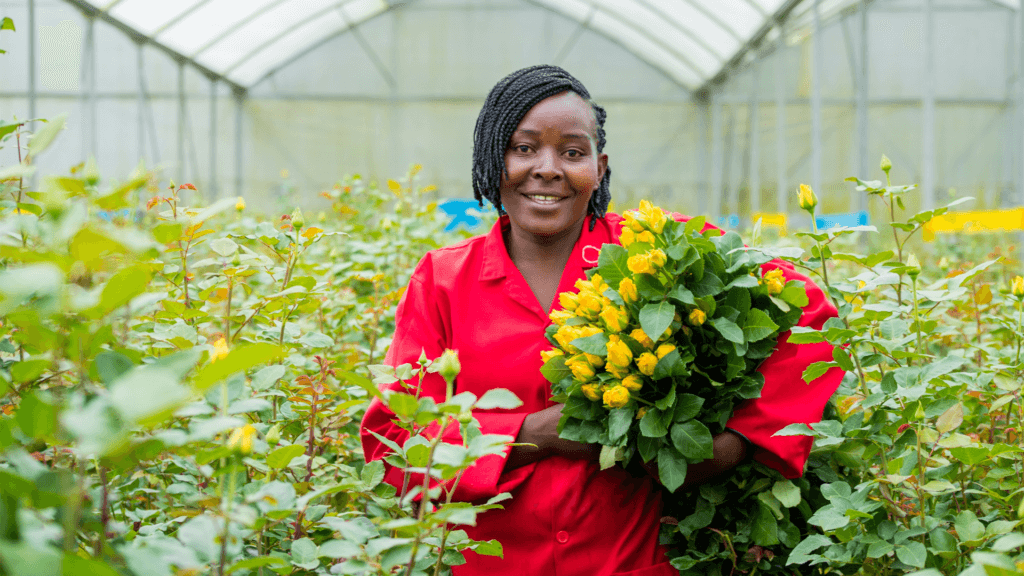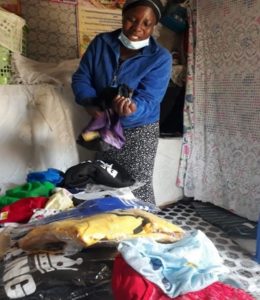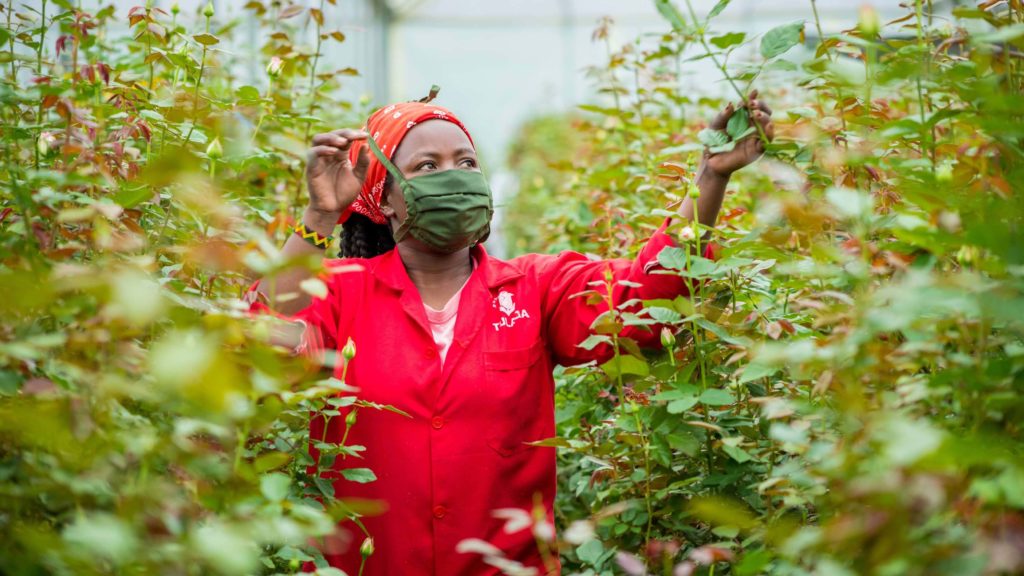Co-op, Coventry University, FNET, M&S, MM Flowers, Tesco and Women Working Worldwide partnered with Fairtrade on a project for the floriculture sector.
Industry-wide innovation
This case study demonstrates how partnering with Fairtrade can generate industry-wide innovation. In June 2020, Fairtrade collaborated with Co-op, Coventry University, FNET, M&S, MM Flowers, Tesco and Women Working Worldwide to deliver a 12-month project, Building Resilience in Flower Supply Chains, with funding from the FCDO’s Vulnerable Supply Chain Facility [1]. The project was part of a government-funded initiative to support workers in developing countries during the COVID-19 pandemic.
The project aimed to provide vital support to Kenyan flower farms and workers to ensure they could operate safely and bridge income gaps during the pandemic. It also aimed to carry out research and hold forums to lead discussions on how to create a more sustainable future for the floriculture sector. These two approaches were highly complementary since the pandemic had highlighted systemic issues within these supply chains.
[1] This project was funded by the Vulnerable Supply Chains Facility (VSCF), a rapid COVID-19 response fund set up by the UK Foreign, Commonwealth and Development Office (FCDO), and managed by Mott MacDonald Ltd. The Facility has partnered with 20 UK and international retailers and brands, supporting over 292 suppliers across Bangladesh, Ethiopia, Ghana, Kenya, Myanmar, Tanzania, and Zimbabwe. It will provide economic, social, and health benefits to around 1 million women and men directly and indirectly.
The pandemic hit flower communities, especially women, hard

Fairtrade formed a partnership in response to the immediate impact of COVID-19 on flower exporting countries. The East African flower sector was particularly hard-hit by the pandemic, with flower sales in the region plummeting and demand dropping in April 2020 alone to 20 percent of normal levels. This placed a big burden on an industry that employs an estimated two million people directly and indirectly, mostly women.
We were not prepared for the pandemic and its effects… I was forced to cut on costs and prioritise spending on house rent and food: at some point it became a struggle to survive
Caroline Shikuku
Fairtrade had been closely following the situation among our producer networks. By the third week of March 2020, 30,000 temporary flower workers in Kenya had lost their jobs and 40,000 workers were placed on leave. We immediately adapted the Fairtrade Premium to allow it to be spent rapidly on direct cash distributions to workers, for PPE supplies or to distribute food.
We continued to investigate other ways of providing urgent support, reaching out to our industry partners to explore potential avenues.
A partnership for producers
The Fairtrade Foundation and Fairtrade Africa formed a partnership with Co-op, Coventry University, FNET, M&S, MM Flowers, Tesco and Women Working Worldwide to design a joint project and were awarded funding from the Vulnerable Supply Chain Facility in July 2020.
Over a 12-month period, through support from the project, flower workers were shielded from some of the impacts of COVID-19 through an awareness campaign providing advice on operating safely on farms. Over 6,000 people also received health packages containing masks, soap and hand sanitiser. Gardens growing fruit and vegetables were also established to increase access to food for around 3,000 workers.
Flower farms and workers built resilience with the support of grants and training on alternative income generating activities and farm managers started to pilot diversification activities using seed funding from the project. By the end of the project, there was a marked increase in preparedness for shocks among the farms who participated in the programme.

Around two-thirds of workers who started a new income generating activity after the training went on to generate income within a month.
Before the training I used to struggle a lot, I became a widow at a young age. With young children to raise I focused on raising them. After the training, I got past my hopeless thinking, learnt that even with my meagre finances I can still save up and set up a business. Thanks to the grant […] I have now started a clothes selling business that is helping me to achieve my desired income.
Selina Auma Oduor
In addition, the project team commissioned research to better understand directly how the farms and workers were affected by the pandemic and what we can learn from this to make flower supply chains more resilient, to protect from similar future crises. Our surveys, which reached over 2,000 workers, found that only 35 percent of workers reported having enough food at home to feed themselves and their families and 28 percent reported that their wages last until the end of the month.
Driving sector change
We recognise that these programmes are not enough, and that Fairtrade alone cannot solve some huge systemic challenges. Fairtrade Foundation, MM Flowers and Coventry University organised a series of roundtables with our retailer partners, in which we explored how to create more resilient supply chains in light of the systemic issues exacerbated by COVID-19. This included hearing first-hand from farm managers and discussing the results of the research. A key finding was that action needs to be taken across the UK floriculture industry in order to have the type of impact we envisage.
These sessions contributed to research carried out by Coventry University into purchasing practices and consumer behaviour during the pandemic and resulted in the publication of a joint recommendations paper for building back better in the floriculture sector. Recommendations include a proposal for a UK industry-wide British Covenant for Sustainable Flowers, which could lead to more resilient supply chains, and improve the livelihoods of farms and workers.
COVID has been an unprecedented crisis and has had an unprecedented impact on many of the people in our supply chains and […] what we’ve found is that those really strong partnerships and relationships that we’ve had in place have been absolutely key to our response on COVID. Through the FCDO project those really strong partnerships that we had in place could come together […] and we were able to come together really rapidly to respond to the crisis that workers in the agriculture sector in Kenya were facing.
Aisha Aswani, Senior Human Rights and Ethical Trade Manager, Co-op
While implementing the project, we at the Fairtrade Foundation presented on the partnership at various forums and events* as a way of amplifying our learnings and engaging sector-wide involvement. As project partners, we jointly presented at two Business Partnerships as a Force for Good events, a webinar organised by FNET, and a Vulnerable Supply Chain Facility Agriculture Event presented by MM Flowers and Emerging Leaders. Aisha Aswani from the Co-op also took part in a panel discussion on how partnerships can support our collective efforts to rebuild better from the pandemic, using examples from this project.
*Partnerships Empowering Women During the Pandemic
Vulnerable Supply Chain Facility Agriculture Event
Next up

Tate and Lyle Sugars and Fairtrade fight child labour together in Belize
Get in touch
Enquiries
This page is currently under maintenance.
We apologise for any inconvenience caused.
